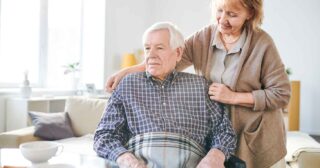
Why you may be eligible for Carer’s Allowance
There has been a lot in the news about problems with Carer's Allowance and people earning...read more
Helen Tite from iCareiMove talks to workingwise.co.uk about why health needs to be more central at work as the working population ages.

Helen Tite [pictured above] started her first fitness company in 2003. She wasn’t a conventional fitness instructor, being fairly overweight, and she always had an interest in what she calls ‘the waifs and strays’. “I am that girl who will find people who need more support,” she says.
That approach stemmed in part from her experience growing up. Her dad had a stroke when she was 19 and she watched her mum having to dedicate her life to caring for him.
Helen firmly believes that everything in life is manifested in the body so it is important to look after your body. As more people are spending more of their lives at work, with the state pension age being pushed back, greater numbers of people – particularly women – will be in the position of working and caring in the future, she says. Wellness is crucial.
iCareiMove was set up in 2015 and Helen is its Managing Director. It works with the NHS, local councils, the hospitality sector, the corporate and care sectors and more and offers online training programmes for individuals and employers around menopause as well as rehabilitative sessions for those with chronic health conditions. These include MS, chronic fatigue and Long Covid. The latter involves gentle exercises, a focus on posture, breathing and developing spinal and leg strength. The rehabilitative sessions are delivered free to people in Cornwall and there is a nominal fee for those outside Cornwall. Helen adds that this can be waived if necessary.
The menopause sessions are about educating employers and others about the menopause at work and how small adaptations can make a big difference. Helen is passionate about the need for greater awareness and less stigma. “There is a lot of talk about diversity, equity and inclusion, but what about the ageing female. We are fairly blinkered about women getting older. Our aim is to inspire employers to support women,” she says.
The organisation, which provides consultancy on dementia and coaching, also works with charities to help people who have health issues to get back into the workforce or stay in it and is collaborating on the Ageing Greatly Project in the Isles of Scilly which involves lunch and learns about issues ranging from hydration to nutrition.
Helen says there needs to be much more focus on helping those with chronic health issues as a result of ageing. She says the focus on longevity can sometimes be too upbeat and ignore reality. “We need to acknowledge that disease is often part of our future, but we can take steps to act preventively,” she says. Another issue is for employers to plan ahead.
iCareiMove has been working with one employer with an ageing workforce and little succession planning. A lot of the work involves heavy lifting. iCareiMove has been advising on back strengthening exercises. Helen feels strongly that employers need to look at how they can redeploy people and use their knowledge, emotional intelligence and skills better as they age. And she would like to see greater attention paid to the language we use around ageing so that it is not overly negative and more stories shared about older people’s lives.
During the pandemic Helen has seen a big impact on fitness as people have been less mobile due to working from home more and have put on more weight. That has an impact on their confidence around going back to work and may combine with anxiety about the virus and other health and emotional issues, such as bereavement. She adds that mental and physical health are linked.
She thinks it is vital that employers are empathetic and understand more about health and wellbeing, including the impact of the menopause, and how small changes can make a difference. If they respect their employees, they will be repaid in greater commitment and loyalty, she says. She adds that the fitness industry was ‘battered’ by Covid, but is vital for our recovery from it. She calls it ‘the fifth emergency service’.
Helen notes that the menopause sessions the organisation runs often end up in discussions about a whole range of issues. She also runs an online menopause group on Facebook which reaches 1,300 women. It is a free service and topics covered range from how to have conversations with managers and GPs. She would like to see more women involved in shaping what the menopause might look like in the future when it comes to healthcare. “Menopause gets people into the room and gets their voices heard,” she says.